Papers and book chapters by James Maguire

Science, Technology, and Human Values, 2021
This paper explores an informal acoustic method developed by a group of industrial geologists wor... more This paper explores an informal acoustic method developed by a group of industrial geologists working in geothermal energy landscapes in the southwest of Iceland. Through a series of ethnographic descriptions, this paper renders the work these geologists carry out in sonic terms, emphasizing how they use their bodies as sonic detectors in the production of geological evidence. Sound, the paper argues, is what allows geologists to make the intractable problem of volcanic cooling doable. It does this by differentiating two forms of evidence. Primary evidence, which ends up as data in geological reports, and secondary sonic evidence, which is what establishes that this primary evidence is, in fact, evidence. The paper introduces the concept data echoes as a way to think about how sound articulates between these evidential protocols. As echo, sound works as an outside, which, while remaining external to official protocols of knowledge production, nevertheless helps to constitute distinctions that are meaningful to the production of those categories. As data echoes through the various moments of data capture, analysis, and model building, sound's
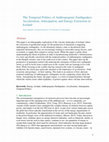
Time and Society, 2020
This paper is an ethnographic exploration of the volcanic landscapes of Iceland, where the extrac... more This paper is an ethnographic exploration of the volcanic landscapes of Iceland, where the extraction of geothermal energy for the production of aluminum is triggering anthropogenic earthquakes. As the aluminum industry seeks to decarbonize their industrial infrastructure, they are increasingly looking to renewable energy havens, such as Iceland, to supply their expansive energy needs. While this paper is partly about understanding the forms of politics at stake in decarbonizing modernity's infrastructures, it is more specifically concerned with the temporal politics of anthropogenic earthquakes in the Hengill volcanic zone in the south west of the country. The paper takes up the perspective of geologists tasked with analysing the emergence of these new earthquake forms, as well as locals from a small town in the vicinity who are learning to live with them. While focusing on the conflict that has ensued in the wake of earthquake production, the article pays particular attention to the importance of acceleration-both economic and geologic-in their making. This leads to an analysis of how alternate temporal renderings of anthropogenic earthquakes invoke competing claims about the future. Anticipating the future, the paper argues, is a form of temporal politics through which the various actors either legitimise, or protest against, these volcanic interventions.

Encounters, Jul 2018
This paper takes its point of departure in the years leading up to, and
shortly after, the outbre... more This paper takes its point of departure in the years leading up to, and
shortly after, the outbreak of World War One; a period that saw the
emergence of Europe’s first aeroplanes. It argues that the production of
new aerial objects required not just imaginative leaps in technology,
but also the making of possible futures into which such technologies
could fit. In order to elaborate this argument, the paper engages with
the life and work of J.C.H Ellehammer, the Danish inventor-entrepreneur
who claimed the honour of being the first man to fly in Europe in
1906. Through an examination of Ellehammer’s heterogeneous activities
and practices, I argue that his initial aerial prototypes are ‘notquite-
yet-flying machines.’ As technologies of anticipation they model,
or rehearse, a version of the future through which such machines could
become more acceptable to a sceptical public and find their place within
a broader national discourse on flying. This is based upon a particular
reading of the prototype as both an epistemic object and an epistemic
culture, and upon a rendering of prototyping as an analytic that approaches
the craft and agency of objects in particular ways.
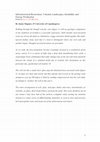
Engagement: Anthropology and Environment Society, a section of the American Anthropological Association, 2016
Walking through the Hengill volcanic zone (figure 1) with my geologist companions in the southwes... more Walking through the Hengill volcanic zone (figure 1) with my geologist companions in the southwest of Iceland is a powerful experience. Dark basaltic lava-encrusted rocks are strewn all about us. Diminutive craggy structures blend together like multilayered mobius strips such that it's hard to distinguish where one rock ends and another begins. Thoughts of a fractal nature are provoked. As we walk, the lava formations become creepingly encased in a wondrously green mossy canvas. It is a canvas of light atop a deep dark smouldering inner earth, a surprisingly lively combination that softly changes hue as the sun rolls back and forth between the clouds of a standard misfit day in Iceland. Our destination on this particular day: geothermal well number 28. The well sits like a small silver igloo atop the blackened lava encrusted earth (figure 2), its pipes are thick and rusted, and they pulsate and screech as the geology team attempt to coax up 300 degree C fluid by sending compressed air into the well shaft; an attempt to 'awaken' the well as they put it. The entire arrangement of well, igloo, and pipes shakes and roars, intermittently yet violently, as dense, thick steam billows out from the earth. This scene disabuses me of any notion I may have had of the earth as a singular entity, turning my attention instead to a whole series of differentiating intensities at work as heat and pressure boil and explode water and steam out of the subterranean rock matrix.
Maguire, James, Murray, Declan and Wallsten, Björn. "Our Electric Metals." Theorizing the Contemp... more Maguire, James, Murray, Declan and Wallsten, Björn. "Our Electric Metals." Theorizing the Contemporary, Cultural Anthropology website, December 19, 2017. https://culanth.org/fieldsights/1271-our-electric-metals
Gambling Debt: Iceland's Rise and Fall in the Global Economy
is enrolled at the IT University of Copenhagen as a PhD Fellow. He did his fieldwork among fisher... more is enrolled at the IT University of Copenhagen as a PhD Fellow. He did his fieldwork among fisheries scientists and fishermen in an Icelandic village, documenting the effects of turning fish into a scientific, legal and economic abstraction. In this chapter he describes how ITQs affected rural Iceland. He introduces the term "virtual fish," echoed by a later contributor as "paper fish," or those that are not made of flesh but are still quite real. He describes how a process billed as one that would create abundance instead caused scarcity, just one contradiction among many he illustrates here.
Infrastructures and Social Complexity: A Companion
Drafts by James Maguire
Papers by James Maguire
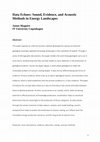
Science, Technology, & Human Values, 2021
This paper explores an informal acoustic method developed by a group of industrial geologists wor... more This paper explores an informal acoustic method developed by a group of industrial geologists working in geothermal energy landscapes in the southwest of Iceland. Through a series of ethnographic descriptions, this paper renders the work these geologists carry out in sonic terms, emphasizing how they use their bodies as sonic detectors in the production of geological evidence. Sound, the paper argues, is what allows geologists to make the intractable problem of volcanic cooling doable. It does this by differentiating two forms of evidence. Primary evidence, which ends up as data in geological reports, and secondary sonic evidence, which is what establishes that this primary evidence is, in fact, evidence. The paper introduces the concept data echoes as a way to think about how sound articulates between these evidential protocols. As echo, sound works as an outside, which, while remaining external to official protocols of knowledge production, nevertheless helps to constitute distinc...

STS Encounters
All of the contributions to this special issue are occupied with how to engage data otherwise. Th... more All of the contributions to this special issue are occupied with how to engage data otherwise. This otherwise indexes the rich variety of approaches to data beyond what we are currently witnessing. Whether through the development of politically and ethically relevant forms of data experiments, or the construction of alternative visions of the much-critiqued data infrastructures of powerful platform providers, all the articles reflect upon how we - as scholars and citizens - can live and work with data in ways amenable to diverse, critical, and ethical forms of social existence. This introduction intervenes in this debate in its own particular way, principally by considering what it means to characterise the contemporary as a data moment. The term data moment, we argue, works as a conceptual device calling for more ethical-political engagement with data practices. At the same time, it also retains a temporal inflection. Moments, we claim, are not sequential steps in a linear process,...
DASTS is the primary academic association for STS in Denmark. Its purpose is to develop the quali... more DASTS is the primary academic association for STS in Denmark. Its purpose is to develop the quality and breadth of STS research within Denmark, while generating and developing national and international collaboration.

This paper takes its point of departure in the years leading up to, and shortly after, the outbre... more This paper takes its point of departure in the years leading up to, and shortly after, the outbreak of World War One; a period that saw the emergence of Europe’s first aeroplanes. It argues that the production of new aerial objects required not just imaginative leaps in technology, but also the making of possible futures into which such technologies could fit. In order to elaborate this argument, the paper engages with the life and work of J.C.H Ellehammer, the Danish inventor-entrepreneur who claimed the honour of being the first man to fly in Europe in 1906. Through an examination of Ellehammer’s heterogeneous activities and practices, I argue that his initial aerial prototypes are ‘notquite-yet-flying machines.’ As technologies of anticipation they model, or rehearse, a version of the future through which such machines could become more acceptable to a sceptical public and find their place within a broader national discourse on flying. This is based upon a particular reading of t...

digitalSTS, 2019
Science and Technology Studies (STS) has a long-standing interest in the nature, effects, and emb... more Science and Technology Studies (STS) has a long-standing interest in the nature, effects, and embedded politics of infrastructures. Recent infrastructure studies focus on how realities are made, relationally, and consider infrastructures as sites of experimentation. Of interest in this paper are the imaginative dimensions of infrastructures as they perform a techno-imaginative setup for people to pass through. Designing and installing The Energy Walk and four digital walking sticks in a small town on the Danish west coast illustrate the capacity of infrastructure to relate and juxtapose entities that were not related in exactly this way prior to the installation. The chapter describes how The Energy Walk emerged as an infrastructure for making relations within and between marine renewable energy, nature, landscape and the public as well as between researcher beliefs and new insights. Working through affect and spurring the visitors' imagination The Energy Walk brought into contact what was known and tangible and what was not immediately visible. Based on a discussion of technologies of the imagination we conclude that if there is a distinct role for the digital in STS it could be as an unruly research participant, which has the capacity to infrastructure that which is ephemeral or not quite seen.
Anthropological Journal of European Cultures, 2020
This paper offers an ethnographic perspective on the relationship between resource landscapes and... more This paper offers an ethnographic perspective on the relationship between resource landscapes and the state in Iceland during a period of financial experimentation. In particular, it analyses a shift from the production of thermal water for local use to the production of electricity for the global aluminium market. This shift, the paper argues, is not merely a technocratic exercise in further resource extraction, it also indexes some of the tenuous connections between resource making and state making. The paper ends by offering a perspective on the recursive relationship between resource instabilities and instabilities within the state.
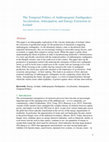
Time & Society, 2019
This paper is an ethnographic exploration of the volcanic landscapes of Iceland, where the extrac... more This paper is an ethnographic exploration of the volcanic landscapes of Iceland, where the extraction of geothermal energy for the production of aluminum is triggering anthropogenic earthquakes. As the aluminum industry seeks to decarbonize their industrial infrastructure, they are increasingly looking to renewable energy havens, such as Iceland, to supply their expansive energy needs. While this paper is partly about understanding the forms of politics at stake in decarbonizing modernity’s infrastructures, it is more specifically concerned with the temporal politics of anthropogenic earthquakes in the Hengill volcanic zone in the south west of the country. The paper takes up the perspective of geologists tasked with analyzing the emergence of these new earthquake forms, as well as locals from a small town in the vicinity who are learning to live with them. While focusing on the conflict that has ensued in the wake of earthquake production, the article pays particular attention to t...
Gambling Debt: Iceland's Rise and Fall in the Global Economy, 2014
Energy Worlds in Experiment is an experiment in writing about energy and an exploration of energy... more Energy Worlds in Experiment is an experiment in writing about energy and an exploration of energy infrastructures as experiments. Twenty authors have written collaborative chapters that examine energy politics and practices, from electricity cables and energy monitors to swamps and estuaries. Each chapter proposes a unique format to tell energy worlds differently and to stimulate energy imaginaries: thesis, propositions, interviews, stories, card games, and a graphic novel. The book offers practitioners, students, and scholars a range of new tools to help think, engage and critique energy politics, practices and infrastructures.
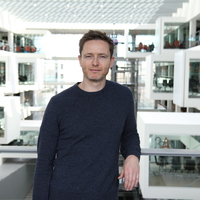

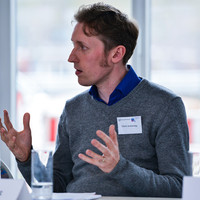








Uploads
Papers and book chapters by James Maguire
shortly after, the outbreak of World War One; a period that saw the
emergence of Europe’s first aeroplanes. It argues that the production of
new aerial objects required not just imaginative leaps in technology,
but also the making of possible futures into which such technologies
could fit. In order to elaborate this argument, the paper engages with
the life and work of J.C.H Ellehammer, the Danish inventor-entrepreneur
who claimed the honour of being the first man to fly in Europe in
1906. Through an examination of Ellehammer’s heterogeneous activities
and practices, I argue that his initial aerial prototypes are ‘notquite-
yet-flying machines.’ As technologies of anticipation they model,
or rehearse, a version of the future through which such machines could
become more acceptable to a sceptical public and find their place within
a broader national discourse on flying. This is based upon a particular
reading of the prototype as both an epistemic object and an epistemic
culture, and upon a rendering of prototyping as an analytic that approaches
the craft and agency of objects in particular ways.
Drafts by James Maguire
Papers by James Maguire
shortly after, the outbreak of World War One; a period that saw the
emergence of Europe’s first aeroplanes. It argues that the production of
new aerial objects required not just imaginative leaps in technology,
but also the making of possible futures into which such technologies
could fit. In order to elaborate this argument, the paper engages with
the life and work of J.C.H Ellehammer, the Danish inventor-entrepreneur
who claimed the honour of being the first man to fly in Europe in
1906. Through an examination of Ellehammer’s heterogeneous activities
and practices, I argue that his initial aerial prototypes are ‘notquite-
yet-flying machines.’ As technologies of anticipation they model,
or rehearse, a version of the future through which such machines could
become more acceptable to a sceptical public and find their place within
a broader national discourse on flying. This is based upon a particular
reading of the prototype as both an epistemic object and an epistemic
culture, and upon a rendering of prototyping as an analytic that approaches
the craft and agency of objects in particular ways.
to engage data otherwise. This otherwise indexes the rich variety of
approaches to data beyond what we are currently witnessing. Whether
through the development of politically and ethically relevant forms
of data experiments, or the construction of alternative visions of the
much-critiqued data infrastructures of powerful platform providers,
all the articles reflect upon how we––as scholars and citizens––can
live and work with data in ways amenable to diverse, critical, and
ethical forms of social existence. This introduction intervenes in this
debate in its own particular way, principally by considering what
it means to characterise the contemporary as a data moment. The
term data moment, we argue, works as a conceptual device calling for
more ethical-political engagement with data practices. At the same
time, it also retains a temporal inflection. Moments, we claim, are not
sequential steps in a linear process, but are themselves productive
of, and products of, temporal orders. Moments are also saturated in
affect, we argue, and it is such affects that contribute to how particular
forms of meaning emerge with/as data. By embracing the compelling
empirical, theoretical and ethical challenges of this data moment our
ambition with this special issue is to make a modest contribution to
how scholars can engage data in the present, while also shaping a future
where data are treated critically, ethically, and reflexively.
Each chapter proposes a unique format to tell energy worlds differently and to stimulate energy imaginaries: thesis, propositions, interviews, stories, card games, and a graphic novel. The book offers practitioners, students, and scholars a range of new tools to help think, engage and critique energy politics, practices and infrastructures.